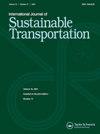Disrupted intermodality: Examining adaptation strategies to public transport e-scooter bans in Barcelona
IF 3.9
3区 工程技术
Q2 ENVIRONMENTAL STUDIES
International Journal of Sustainable Transportation
Pub Date : 2024-12-01
DOI:10.1080/15568318.2024.2434881
引用次数: 0
Abstract
Electric scooters (e-scooters) have changed urban mobility by offering a dynamic solution to the critical “first and last mile” problem, connecting individuals from their homes to public transport and their final destinations. Despite their growing popularity, e-scooters navigate through a landscape of shifting legal frameworks, highlighting the urgency for policies that not only harness their potential but also address their inherent challenges. This study aims to shed light on the intermodal practices and demographics of e-scooters users in Barcelona, explores the potential impacts of regulatory changes on established transport habits, and assesses the adaptability of users to changing transportation options. Through a self-reported survey of 311 private e-scooter users, we find a notable prevalence of young men from lower socioeconomic backgrounds engaging in intermodal travel, primarily for employment purposes. To better understand how e-scooter riders integrate the device in their daily mobility strategies, we introduce the Intermodality Ratio (IR). A Generalized Linear Model (GLM) is then used to identify key demographic, socioeconomic, and geographic predictors of the IR, revealing place of residence as the most significant factor influencing intermodal behavior. Finally, we analyze participants’ anticipated behavioral shifts in response to the upcoming ban using a Multinomial Logistic Regression (MLR) model, which explores the sociodemographic factors affecting the likelihood of adopting alternative transport strategies. These findings contribute to the limited understanding of e-scooter utilization and intermodal practices, particularly within the context of public transit, offering insights into how transport policies can more effectively accommodate emerging mobility solutions.
中断的多式联运:考察巴塞罗那公共交通电动滑板车禁令的适应策略。
电动滑板车(e-scooters)通过为关键的“第一英里和最后一英里”问题提供动态解决方案,将个人从家中连接到公共交通和最终目的地,改变了城市交通。尽管电动滑板车越来越受欢迎,但法律框架也在不断变化,这凸显了制定政策的紧迫性,这些政策不仅要利用电动滑板车的潜力,还要解决其固有的挑战。本研究旨在揭示巴塞罗那电动滑板车用户的多式联运实践和人口统计数据,探讨监管变化对现有交通习惯的潜在影响,并评估用户对不断变化的交通选择的适应性。通过对311名私人电动滑板车用户的自我报告调查,我们发现社会经济背景较低的年轻男性参与多式联运旅行的显著流行,主要是为了就业目的。为了更好地了解电动滑板车使用者如何将设备融入他们的日常出行策略,我们引入了多式联运比率(IR)。然后使用广义线性模型(GLM)来确定IR的关键人口、社会经济和地理预测因子,揭示居住地是影响多式联运行为的最重要因素。最后,我们使用多项逻辑回归(MLR)模型分析了参与者对即将到来的禁令的预期行为转变,该模型探讨了影响采用替代交通策略可能性的社会人口因素。这些发现有助于对电动滑板车的使用和多式联运实践的有限理解,特别是在公共交通的背景下,为交通政策如何更有效地适应新兴的移动解决方案提供了见解。
本文章由计算机程序翻译,如有差异,请以英文原文为准。
求助全文
约1分钟内获得全文
求助全文
来源期刊
CiteScore
8.90
自引率
2.60%
发文量
56
期刊介绍:
The International Journal of Sustainable Transportation provides a discussion forum for the exchange of new and innovative ideas on sustainable transportation research in the context of environmental, economical, social, and engineering aspects, as well as current and future interactions of transportation systems and other urban subsystems. The scope includes the examination of overall sustainability of any transportation system, including its infrastructure, vehicle, operation, and maintenance; the integration of social science disciplines, engineering, and information technology with transportation; the understanding of the comparative aspects of different transportation systems from a global perspective; qualitative and quantitative transportation studies; and case studies, surveys, and expository papers in an international or local context. Equal emphasis is placed on the problems of sustainable transportation that are associated with passenger and freight transportation modes in both industrialized and non-industrialized areas. All submitted manuscripts are subject to initial evaluation by the Editors and, if found suitable for further consideration, to peer review by independent, anonymous expert reviewers. All peer review is single-blind. Submissions are made online via ScholarOne Manuscripts.

 求助内容:
求助内容: 应助结果提醒方式:
应助结果提醒方式:


